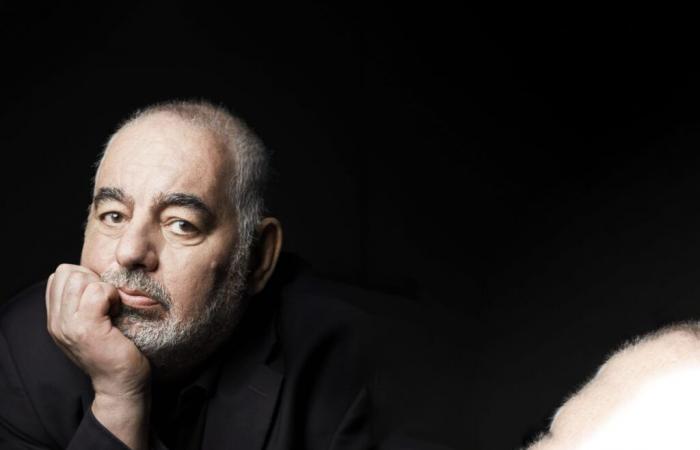Philippe Jaenada
Those who have already ventured into a book by Philippe Jaenada know… The method – which could not be more personal – has proven itself: seize a more or less forgotten news item, find the flaw to slip a curious eye into it and conduct an investigation whose ramifications, including those leading to the author’s personal life, border on the idea of infinity. This modus operandi has produced robust novels (around 600-700 pages), original and acclaimed.
The little femalevery good work on the Pauline Dubuisson case, accused of having killed her lover. The billhookPrix Femina 2017 and a fantastic literary Cluedo about a triple murder in a castle locked from the inside. In the spring of monstersan obsessive and haunting reconstruction of the Lucien Léger case, convicted of the murder of a child. Books that could resemble others, so much is the trend towards revisiting criminal cases, a small passion of the time, except that Philippe Jaenada’s books are marked with a “Z” which means “Zorro”.
Philippe Jaenada’s books smell of Jaenada from ten kilometers away, with his Columbo-like explorer style (falsely candid, truly clever), his style (the digression, the parenthesis and the parenthesis within the parenthesis), his archivist’s point of view and this way of putting himself on stage in the story without ever making himself look ridiculous or boring, regularly quoting his wife (like Columbo).
The method is therefore known, it was used again for the needs of his new quest novel, Casualness is a beautiful thing.shortlisted for the Goncourt and Renaudot prizes. The book is a long account of a road trip in today’s France in search of the truth about the death of a young woman – Jacqueline Harispe, known as Kaki – who allegedly threw herself out of a window in 1953. “What grabbed me in this story was a photo of her, explains Jaenada.This photo comes from a series by Dutch photographer Ed van der Elsken who made a book from it – Love On The Left Bank . I discovered in these photos a group of kids who frequent a place in the Latin Quarter, Chez Moineau, and I felt something…”
Behind your investigation into the death of this young girl in the early 1950s, we find a book about youth…
PHILIPPE JAENADA – I never said to myself that I was going to paint a portrait of a youth. I didn’t want to write a book about youth, I didn’t want to look at my own youth. I just wanted to be interested in these characters who touch me, but many people, who have nothing to do with them, tell me “I feel like it’s me”and I like it.
Among the characters in this group, we come across Guy Debord, the theoretician of situationism. What is he doing there?
I don’t like him, but he frequents this café Chez Moineau. Without him, no one would know who these people are because he paid tribute to them in his films and in his writings, but I blame him… I blame Debord for having observed what he wanted to observe at Chez Moineau – and you have to know how to do it – and then afterwards, for having rejected these kids like shit.
Has your working method evolved over the course of the books or does it always meet the same requirements?
It always meets the same criteria, I am someone who is hyper-routine. First, I dissociate myself from the novel, I dive into the truth. I start by raiding the Internet on my subject, then I move on to the archives… I only start writing from the moment I have gathered all my documentation and everything is classified. Then, I do the opposite, I forget that it is real, I act as if all this were only fiction, I do my job as a writer and I do nothing but write.
“People tell me that what I do is work… But not at all, it’s like playing ping-pong.”
This way of working and telling the story of your investigation is a way of doing things alone with the habits of a quasi-sales representative…
Yes, a sales representative who has no business to represent. For this book, I tour France, I work in hotels, I go to bars, to restaurants, but it’s a scenario for the needs of the story. Alone, because for two years, that’s all I do and the characters end up becoming imaginary friends. I’m often told that what I do is a lot of work… But not at all, for me, it’s like playing ping-pong.
Your career as a writer specializing in crime stories has led you to focus exceptionally on a contemporary case, that of Alain Laprie, convicted of the murder of an old lady, who claims his innocence. You have made a book about it, Without proof and without confessionwhich showed how quickly the investigation had been rushed. Where are we with this case?
The investigation was reopened in June or July 2023, it did not produce anything. We are in a moment of stagnation… A final expert assessment will be requested and we hope that it will be accepted. Alain, with the media coverage of his case, he was hoping for things, and since nothing is happening, he is not well. His wife is also not well, I am convinced that she is suffering more than him…
It was the first time that an accused person had addressed me directly, and when he told me his story, I said to myself:“especially not”. First because I want to choose my stories, and because I have a problem with telling a story of the present because it is a responsibility. But when I read his file – even if I did not want to deal with it – I had no choice… After the book came out, I received other messages from guys in prison – I am a nice guy, but I can’t and I have to tell them no.
Casualness is a beautiful thing ★★★✩
Philippe Jaenada. Mialet-Barrault, 487 p.






